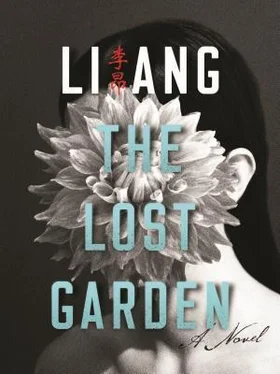With the air-conditioner going full blast, cigarette smoke hung in the air before slowly dissipating. Ear-pounding music sounded anxious and rushed, making it difficult to tell whether the muffled voice of the singer came from a man or a woman, who was screaming as though his or her mouth was full, but with little energy. The customers had to shout, even when sitting across from each other, so most simply sat there, not knowing what else to do. Those who couldn’t stand the boredom looked around the room with glazed eyes.
Suddenly the door opened and in swarmed a half-dozen people led by a short, frail man in his twenties dressed in a black tank top and jeans. A paper sign a full meter in length hung from his neck down to below his knees. Two bright, eye-catching words had been scribbled in red on the white paper:
Help Charlie
Below the English words was a Chinese phrase written from left to right:
Cha-li bing le . Charlie is sick.
Someone snapped off the stereo, creating an abrupt silence that prompted those facing inside to pause in their survey of the bar and turn to look toward the entrance. The young man with the sign walked in slowly, followed by a tall, even younger-looking man, who was also wearing a tank top that showed off his rippling chest, shoulders, and arm muscles. Despite his brawny appearance, he seemed shy and timid; coins clattered in the tall tin can he was shaking.
“Charlie’s sick and we’re collecting money for him,” he said in badly accented Mandarin, glossing over the four tones in a sort of affected monotone, like a foreigner trying to converse in the Beijing dialect. Phony sounding, he was obviously putting on an act.
The bartender, an ordinary-looking woman in her late twenties or early thirties, wore light makeup for the sake of her job, but it was clear she did not rely on looks to succeed in her line of work. No, her competence and experience came through as soon as she opened her mouth to greet the newcomer.
“You’re Xiao Shen from the Lighting House , aren’t you?” She paused. “Isn’t Charlie your manager?”
“Right. He’s in the hospital …”
“Ai! Isn’t he the one who got AIDS ?” a waitress with a serving tray blurted out before Xiao Shen finished.
A momentary silence descended on the bar before animated discussion among the patrons erupted, while Xiao Shen, struggling to be heard over the din, stammered an explanation in English: “ Charlie is sick. We wanna help him .”
One of the three men at a table near the entrance, who had unbuttoned his shirt and loosened his blue-and-red tie, reached into his pocket and took out his wallet. His face red from drinking, he picked out a hundred-NT bill with fair, delicate hands that had also turned red from the alcohol.
“ To Taiwan’s first AIDS case,” he mumbled.
Shen came up with the can, which noiselessly swallowed the bill.
“Thank you. Thanks . Thank you very much.” The other newcomers joined him in thanking the man.
Money flew as noisy drunk patrons began making donations, the occasional laughter adding a cheerful note to the atmosphere. It felt more like the end of a party, when the money is collected or when raffle tickets are drawn. Everyone seemed to be having a great time; gone was the earlier boredom, gloom, and ennui. When someone tossed a handful of coins into the can, the metallic clang and the noise from the bar created a festive air.
The din continued until Shen had made the rounds and was walking to the door, when someone at a table said in a loud voice:
“ AIDS is a condemnation from above, God’s punishment. It’s contagious. You should congratulate yourself he wasn’t arrested and thrown in jail. How dare you come here to collect money?” The speaker was a young white-collar worker. Though his tone was calm and detached, his face was a deathly white, either from alcohol or, possibly, his natural complexion.
A look of loathing flashed in Shen’s eyes, but then disappeared as his expression turned anxious and fearful.
“This is Taiwan’s first AIDS case,” he beseeched deferentially, forgoing his earlier toneless foreign-sounding Mandarin. Now it had a Taiwanese accent. “We worked with Charlie . Don’t you think we’re afraid of catching it? Tell you true , we’re scared to death, but we have to help him. Saving his life is the same as saving our own. Besides, just think , Taiwan’s first AIDS case has historical significance. We have to take this opportunity to find a way out for Taiwan’s gays .”
“I’ll give you some money.”
A Caucasian at the bar cut him off in standard Mandarin as he took out a five-NT coin. Everyone turned to observe him on his bar stool, hand raised high over his head. He showed off the coin like a magician before letting it drop in the can, where it banged crisply against the side before falling silently to the bottom.
“ Thanks .” Shen thanked the man in the same obsequious, anxious tone. “Thanks a lot.” Looking around and seeing that no more donations were forthcoming, he waved at the bartender and left with his friends. She didn’t look up, merely acknowledging his gesture with a faint smile.
The pleasant, cheerful voice of a young woman was heard before the door shut and the rock music started up again:
“They could be partners, the same type, you know . How scary. It ’ s terrible. The world ’ s upside down .”
None of the newcomers turned to look at her.
A rush of stifling summer-night heat enveloped them in sticky warm air the moment they walked out of Red Wood . Their sweat glands, dried and sealed by the air-conditioning, went into overdrive, and they were quickly drenched in sweat, which, with the combined effects of body heat and the sweltering night, turned hot and wrapped itself tightly around them.
“ Damn it . Fuck. Shit!” Shen wiped the sweat from his forehead with his hand. “That foreigner was a real shit. Five NT! That’s ten cents, a dime . That’s no way to treat people. Damn him!”
No one said anything as they crossed the street and entered a narrow lane flanked by flashing neon signs that formed a colorful stream.
“He gave us money,” the short guy carrying the sign said cautiously. “That showed his good intentions.”
Shen rapped him on the head with his knuckles.
“You ought to be ashamed of yourself, forgetting who you are in the presence of a foreigner.”
When they reached the end of the lane, they turned onto a major thoroughfare, where cars surged in waves. A wall of flashing TV screens blocked their view.
“Wow!” they cried out in unison. “That’s amazing.”
They were facing six rows of six twenty-eight-inch TV sets filling the storefront of an electronics shop. It was almost midnight and the TVs were showing the late-night news. A pavilion and a terrace by a pond of water with long, curvy, swaying willow trees that sent tiny ripples across the surface appeared on all thirty-six screens. The multiple display of identical exquisite terraces gave the impression of a continuous, endless row of pavilions, water, and willows, creating a sense of unmatched prosperity, as though, for thousands of years and over hundreds of generations, the willow tips never stopped touching the water and the terrace and pavilion would go on forever. After a while, the rippling water and terrace began to change from screen to screen, becoming dreamlike phantasms, thirty-six separate views running contiguously and endlessly. One pond followed another; each pavilion merged into the next. For a brief moment, the thirty-six screens appeared to morph into an enormous garden crisscrossed with endless terraces, pavilions, and towers.
Читать дальше












